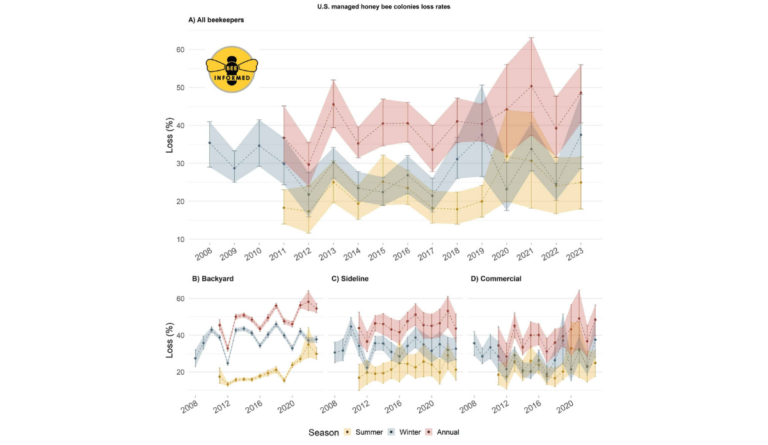Bee Hives Strive to Survive
Bee hive populations are declining, with beekeepers noting a near 50% loss of their colonies from 2022-2023.

Read Time: 2 minutes
Published:
Bees contribute to the planet’s biodiversity and are critical to healthy ecosystems. Honey bees, in particular, transfer pollen, and as a result, 80% of flowering plants and one-third of crops on Earth are sustained by these busy pollinators.
Despite their important role, bee hive populations shrank by more than half in less than a century—moving from 6 million hives in the 1940s to 2.4 million in 2008. The rise of commercial farming pesticides, destruction of pollinator habitats, and climate change are all factors that catalyzed this decline.
Beekeeping has grown more popular as a way to help grow back the bee population, but the latest data shows reason for continued concern.
Nathalie Steinhauer and her team at the nonprofit Bee Informed Partnership worked in collaboration with Maryland University and Auburn University’s Bee Labs to conduct a national Colony Loss and Management Survey. The survey’s primary goal is to monitor the colony loss rate of managed honey bees in the United States. It is also meant to identify important risks and protective factors for bee health.
Results of the survey, taken from April 2022 to April 2023, show that beekeepers lost about 48.2% of their colonies. This was the second-highest loss rate since the 2010-2011 year, and it reveals a continuing challenge to maintain these colonies. The graphs above show results from three categories of 3,000 beekeepers: backyard (up to 50 hives), sideline (up to 500 hives), and commercial (greater than 500 hives), as well as colony losses over the summer, winter, and annually.
The ramifications of climate change continue to loom as a major threat to the future of colony health. Bee pathogens and parasites (like the Varroa mite) are a concern for these colonies’ health, along with additional urbanization and land use that has reduced major food sources for bees.
Experts suggest creating safer spaces for bees to thrive. Planting pollinator gardens, creating backyard meadows, and reducing the use of pesticides all create options that will keep colonies alive and protect our ecosystem.
Databyte via Nathalie Steinhauer , Mikayla Wilson, Dan Aurell, et. al. United States Honey Bee Colony Losses 2022-23. Bee Informed Partnership, 2023.



